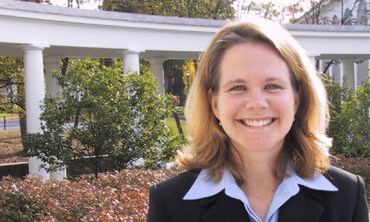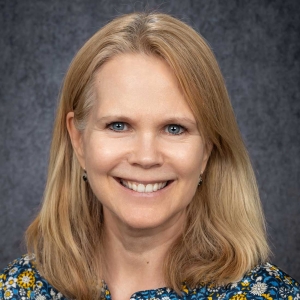Kristin Bidoshi first got the idea of teaching Russian through virtual reality two years ago, when visa problems thwarted a trip with students. “Wouldn’t it be cool if they could have a virtual experience — the second best thing to actually going there — and get to experience the Kremlin, Red Square and Siberia?” said Bidoshi, an associate professor of Russian and director of Russian and East European Studies.
At the time, she was also considering VR to train students in the practical use of Russian verbs of motion, among the most complicated elements of Russian grammar. For example, the unidirectional verb for going to the store (идти) is different from the multidirectional verb for going to the store and returning (ходить ).
“I thought, ‘what if we could combine these two things and have some kind of cultural experience with the grammar in play as well?’” she said.
Unlike most VR games, Bidoshi’s uses real locations. The prototype took shape the summer of 2016, when Bidoshi and her students brought the College’s Faro Laser scanner to New York City’s Brighton Beach. They combined scans of the Russian neighborhood with voice overs and tutorials to create a game through Unity, an open source software.
The game follows a narrative in which the player must navigate Brighton Beach and find a book at the St. Petersburg Bookstore. Along the way, they are guided by commands that include the Russian verbs of motion.
Though “clunky,” Bidoshi says the beta version is a step. She has attended VR conferences, researched VR and state-of-the-art equipment and applied for grants to support the project. She is collaborating with colleagues on newer versions of the game that will include scans of key spots in Moscow and St. Petersburg, but also more unusual locales such as Irkutsk and Lake Baikal in Siberia.
Besides grammar, Bidoshi hopes the VR app will impart some understanding of various Russian accents. Speakers in St. Petersburg, for example, use shorter vowels than the Muscovites. Those in Irkutsk speak Russian tinged with their native Buryat.
Military language institutes and the U.S. Department of State have shown interest in Bidoshi’s VR app. Meanwhile, student interest in the Russian language is at a peak, perhaps because of reports of Russian involvement in the 2016 election, Bidoshi noted.
Bidoshi is clear that VR is a training tool, not a substitute for classroom or in-country learning. But it can shorten the learning curve. “There have been a lot of studies about the time it takes students to master these verbs in-country,” she said. “I hope virtual reality can give them a head start.”


